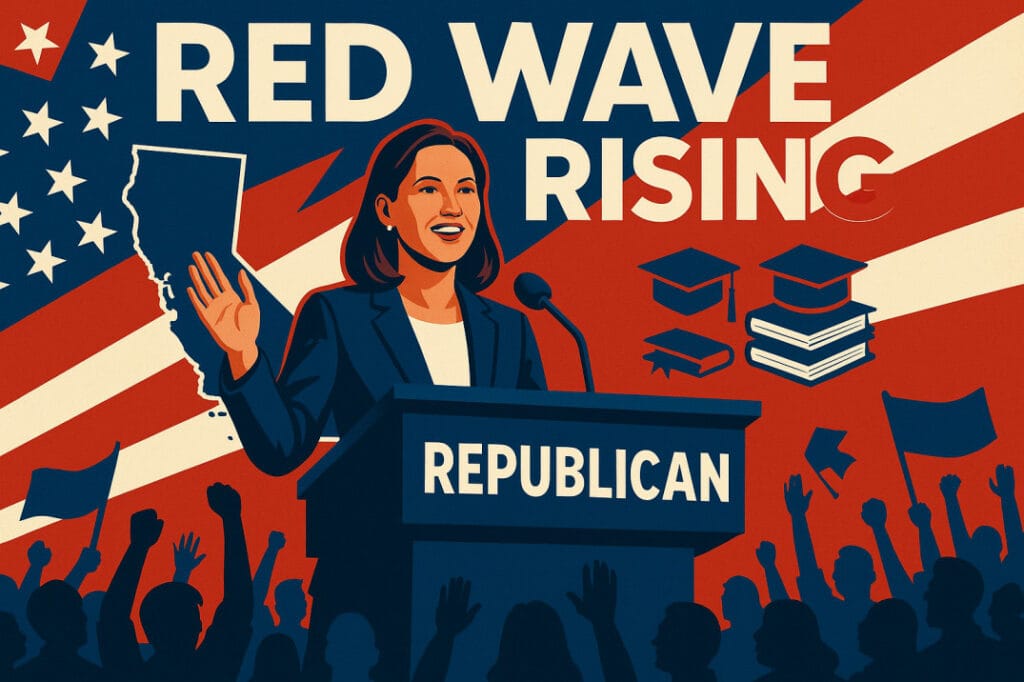Red Wave Rising: Why Sonja Shaw’s Bid for California Schools Chief Has East Bay Republicans Buzzing


Conservative Educator Takes Aim at Sacramento’s Education Establishment in High-Stakes Superintendent Race
The East Bay Republican Club’s September luncheon is generating unusual excitement this month, and for good reason. Featured speaker Sonja Shaw, the conservative candidate vying to become California’s next State Superintendent of Public Instruction, represents something that has been sorely missing from the Golden State’s educational landscape: a genuine alternative to the progressive orthodoxy that has dominated California schools for decades.
As Shaw prepares to address club members in what promises to be a standing-room-only event, her candidacy is emerging as a beacon of hope for parents, educators, and taxpayers who have watched California’s once-prestigious public education system deteriorate under years of misguided policies and ideological extremism.
A Battle for California’s Educational Soul
The race for State Superintendent represents far more than a typical political contest—it’s a fundamental battle for the direction of California’s educational future. For too long, the state’s schools have been laboratories for progressive social experimentation rather than institutions focused on academic excellence. From controversial curriculum mandates to the prioritization of identity politics over core subjects, California’s educational establishment has consistently chosen ideology over achievement.
Shaw’s candidacy offers a refreshing departure from this failed approach. With a background rooted in practical educational experience rather than bureaucratic maneuvering, she brings a perspective that prioritizes student achievement, parental rights, and fiscal responsibility—concepts that have become revolutionary in California’s current educational climate.
The East Bay’s Conservative Awakening
The enthusiasm surrounding Shaw’s East Bay appearance reflects a broader political awakening occurring across the region. Long considered a progressive stronghold, the East Bay has experienced a notable shift as parents and taxpayers have witnessed firsthand the consequences of radical educational policies. From plummeting test scores to the erosion of merit-based programs, the results speak for themselves.
Local Republican clubs like the East Bay organization hosting Shaw have become crucial gathering points for this growing movement. These venues provide opportunities for like-minded citizens to organize, strategize, and support candidates who share their commitment to educational excellence and common-sense governance.
The timing of Shaw’s visit is particularly significant, coming as California parents continue to grapple with the aftermath of pandemic-era school policies that kept children out of classrooms while teachers’ unions wielded unprecedented political influence. Many families discovered during remote learning that their children’s education had been compromised by curricula more focused on social activism than academic fundamentals.
Shaw’s Vision for Educational Reform
What sets Shaw apart from the typical Sacramento education bureaucrat is her comprehensive understanding of the challenges facing California schools and her concrete plans for addressing them. Rather than offering vague promises about “equity” and “inclusion”—buzzwords that have become synonymous with lowered standards and divisive policies—Shaw presents specific solutions grounded in proven educational principles.
Her platform emphasizes returning to educational basics: ensuring students master fundamental skills in reading, writing, and mathematics before advancing to higher grades. This back-to-basics approach may seem obvious, but it represents a radical departure from current California policy, which has increasingly de-emphasized academic achievement in favor of social engineering.
Shaw also champions parental rights in education, recognizing that parents—not government bureaucrats—are the primary stakeholders in their children’s educational journey. This includes supporting transparency in curriculum choices, protecting parental notification rights, and ensuring that schools serve families rather than political agendas.
The Uphill Battle Against the Education Establishment
Shaw’s candidacy faces significant challenges, not least of which is the entrenched education establishment that has controlled California schools for decades. This network of administrators, union leaders, and progressive activists has created a system that prioritizes their own interests over student outcomes, making meaningful reform extraordinarily difficult.
The financial resources arrayed against conservative education candidates are also formidable. Teachers’ unions, in particular, have demonstrated their willingness to spend enormous sums to maintain their political influence, viewing any challenge to their authority as an existential threat.
However, Shaw’s campaign has several advantages that previous conservative candidates may have lacked. The growing parent movement, energized by pandemic-era school policies and ongoing curriculum controversies, provides a motivated base of supporters. Additionally, the stark contrast between Shaw’s practical approach and the incumbent establishment’s failed record creates clear choices for voters.
Beyond Politics: A Movement for Excellence
What makes Shaw’s East Bay appearance particularly significant is that it represents more than campaign politics—it’s part of a broader movement to reclaim educational excellence in California. This movement transcends traditional party lines, attracting Democrats and independents who share concerns about their children’s educational future.
The East Bay Republican Club’s decision to feature Shaw reflects their understanding that education represents a winning issue for conservatives. When presented with clear alternatives between ideological indoctrination and academic achievement, between union control and parental rights, between bureaucratic expansion and classroom focus, voters consistently choose the conservative position.
The Road Ahead
As Shaw addresses the East Bay Republican Club, she carries with her the hopes of countless California families who have watched their children’s educational opportunities diminish under progressive policies. Her candidacy represents an opportunity to reverse decades of educational decline and restore California schools to their former excellence.
The enthusiasm surrounding her East Bay visit demonstrates that conservative ideas about education are not only viable but increasingly popular among parents who have experienced the failures of progressive educational policies firsthand. Whether this translates into electoral success will depend largely on the ability of supporters to mobilize effectively and overcome the institutional advantages enjoyed by the education establishment.
For attendees at the East Bay Republican Club luncheon, Shaw’s appearance offers more than just political inspiration—it provides a glimpse of what California education could become under principled conservative leadership. In a state where educational mediocrity has become the norm, that vision of excellence represents genuine hope for the future.
The September luncheon may be just one event on Shaw’s campaign calendar, but for East Bay conservatives and concerned parents throughout the region, it represents something far more significant: the beginning of a movement to reclaim California’s educational future from the failed policies of the past.












